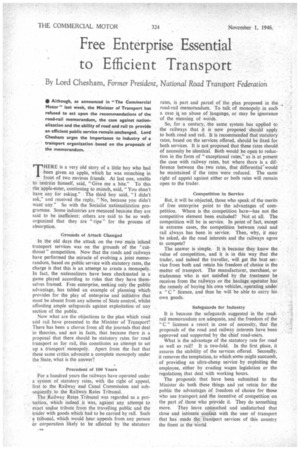Free Enterprise Essential to Efficient Transport
Page 30

If you've noticed an error in this article please click here to report it so we can fix it.
• A:though, as announced in "The Commercial Motor" last week, the Minister of Transport has refused to act upon the recommendations of the road-rail memorandum, the case against nationalization and the ability of road and rail to provide an efficient public service remain unchanged. Lord Chesham urges the importance to industry of a transport organization based on the proposals of the memorandum.
THERE is a very old story of a little boy who had been given an apple, which he was munching in front of two envious friends. At last one, unable to restrain himself, said, "Give me a bite." To this the apple-eater, continuing to munch, said, "You shan't have any for asking." The third boy said, "1 didn't ask," and received the reply, "No, because you didn't want any " So with the Socialist nationalization programme. Some industries are menaced because they are said to be inefficient; others are said to be so wellorganized that they are "ripe" for the process of absorption.
Grounds of Attack Changed
In the old days the attack on the two main inland transport services was on the grounds of the ' cutthroat " competition. Now that the roads and railways have performed the miracle of evolving a joint memorandum, based on public service with statutory rates, the charge is that this is an attempt to create a monopoly. In fact, the nationalizers have been checkmated in a game played according to rules that they have themselves framed. Free enterprise, seeking only the public advantage, has tabled an example of planning which provides for the play of enterprise and initiative that must be absent from any scheme of State control, whilst affording ample safeguards against exploitation of any section of the public.
Now what are the objections to the plan which road and rail have presented to the Minister of Transport? There has been a chorus from all the journals that deal in theories, and not in facts, that because there is a proposal that there should be statutory rates for road transport as for rail, this constitutes an attempt to set up a transport' monopoly. Apart from the fact that these same critics advocate a complete monopoly under the State, what is the answer?
Precedent of 100 Years
For a hundred years the railways have operated under a system of statutory rates, with the right of appeal, first to the Railway and Canal Commission and subsequently to the Railway. Rates Tribunal.
The Railway Rates Tribunal was regarded as a protection, which indeed it was, against any attempt to exact undue tribute from the travelling public and the trader with goods which had to be carried by rail. Such a tribunal, which would hear appeals from any person or corporation likely to be affected by the statutory
rates, is part and parcel of the plan proposed in the road-rail memorandum. To talk of monopoly in such a case 4 an abuse of language, or may be ignorance of the meaning of words.
So, for a century, the same system has applied to the railways that it is now proposed should apply to both road and rail. It is recommended that statutory rates, based on the services offered, should be fixed for both services. It is not proposed that these rates should of necessity be identical. Both would be open to reduction in the form of "exceptional rates," as is at present the case with railway rates, but where there is a difference between the two rates, that differential would be maintained if the rates were reduced. The same right of appeal against either or both rates will remain open to the trader.
Competition in Service But, it will be objected, those who speak of the merits of free enterprise point to the advantages of competition. Where is the competition here—has not the competitive element been excluded? Not at all. The competition will be in service. In point of fact, except in extreme cases, the competition between road and rail always has been in service. Then, why, it may be asked, do the road interests and the railways agree to compete?
The answer is simple. It is because they know the value of competition, and it is in this way that the trader, and indeed the traveller, will get the best service from both and retain his freedom of choice in the matter of transport. The manufacturer, merchant, ot tradesman who is not satisfied by the treatment he receives from the railways or the haulage operator has the remedy of buying his own vehicles, operating under a " C " licence, and thus he will be able to carry his own goods.
Safeguards for Industry
It is because the safeguards suggested in the roadrail memorandum are adequate, and the freedom of the " C " licensee a resort in case of necessity, that the proposals of the road and railway interests have been approved and supported by the chief road-users.
What is the advantage of the statutory rate for road as well as rail? It is two-fold. In the first place, it assures the stability of the services offered. Secondly, it removes the temptation, to which some might succumb, of providing an ultra-cheap service by exploiting the employee, either by evading wages legislation or the regulations that deal with working hours.
The proposals that have been submitted to the Minister do both these things and yet retain for the public the advantages of freedom of choice for those who use transport and the incentive of competition on the part of those who provide it. They do something more. They leave untouched and undisturbed that close and intimate contact with the user of transport that has made the transport services of this country the finest in the world.




































































